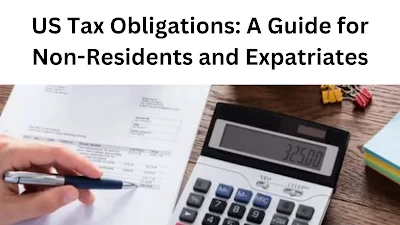Understanding tax obligations in the United States can be a complex affair, especially for non-residents and expatriates who spend time in the country without fully residing there. The U.S. tax system operates on both citizenship and residency principles, meaning that your tax liabilities can be influenced by factors such as the length of your stay in the U.S. and your income sources. This blog post aims to shed light on the critical question: How long can you stay in the US without incurring tax obligations? Additionally, we'll explore the meaning of US expat taxes and their implications for U.S. citizens living abroad.
Understanding US Tax Obligations for Non-Residents
For
non-residents, the Substantial Presence Test (SPT) is a crucial determinant of
tax status in the U.S. The IRS uses this test to decide whether individuals are
considered tax residents for a particular year. Under the SPT, you're
considered a tax resident if you:
- Are
present in the U.S. for at least 31 days during the current year, and
- Have
been present in the U.S. for 183 days over a three-year period, including
the current year and the two years immediately before that. The count is
weighted, with all the days in the current year counted, one-third of the
days from the first year before, and one-sixth of the days from the second
year before.
If you meet these criteria, you're subject to U.S. tax on your global income, similar to a U.S. citizen. However, various exceptions apply, such as for diplomats, students, and individuals on specific visas, who may spend longer periods in the U.S. without triggering tax residency.
Tax Implications for Short Stays
Individuals
who do not meet the Substantial Presence Test's criteria—essentially those
staying in the U.S. for fewer than 183 days over the three-year period—may
still have tax obligations. These obligations are generally limited to income
earned from U.S. sources. The nature of this income (e.g., wages, investment
income) and tax treaties between the U.S. and your home country can affect the
amount of tax you owe.
Meaning of US Expat Taxes
US expat
taxes refer to tax obligations and considerations for U.S. citizens and green
card holders living outside the United States. Unlike many countries that tax
based on residency, the U.S. taxes its citizens and permanent residents on
their worldwide income, regardless of where they live or earn their income.
This means that U.S. expatriates must file annual U.S. tax returns reporting
their global income, although various mechanisms—such as the Foreign Earned
Income Exclusion (FEIE), Foreign Tax Credit (FTC), and tax treaties—can
mitigate double taxation.
Compliance and Planning
For U.S.
expatriates, understanding and complying with tax obligations is crucial.
Failure to file required forms can result in penalties, even if no tax is owed.
It's essential for U.S. citizens living abroad to:
- File
U.S. tax returns if their income exceeds the standard filing requirements.
- Report foreign bank accounts and assets through the Foreign Bank Account Report (FBAR) and the Foreign Account Tax Compliance Act (FATCA) if they meet the thresholds.
- Consider utilizing the FEIE or FTC to reduce their U.S. tax liability based on income earned abroad or taxes paid to foreign governments.

Comments
Post a Comment